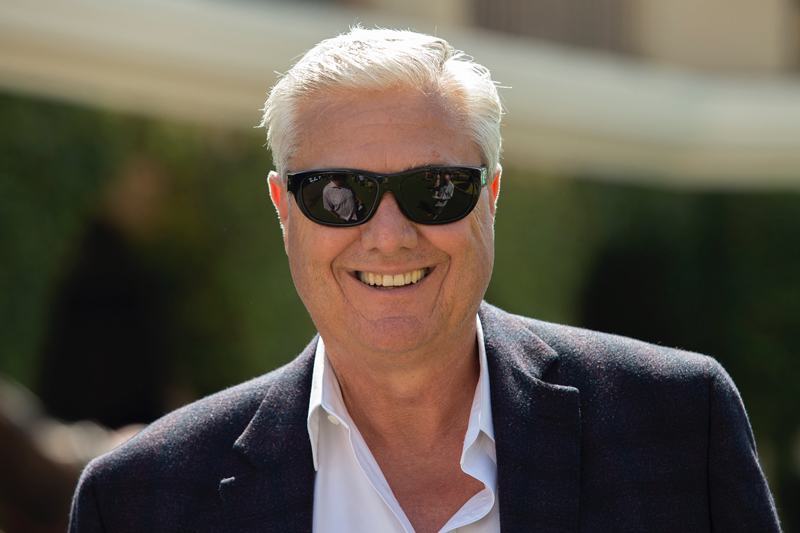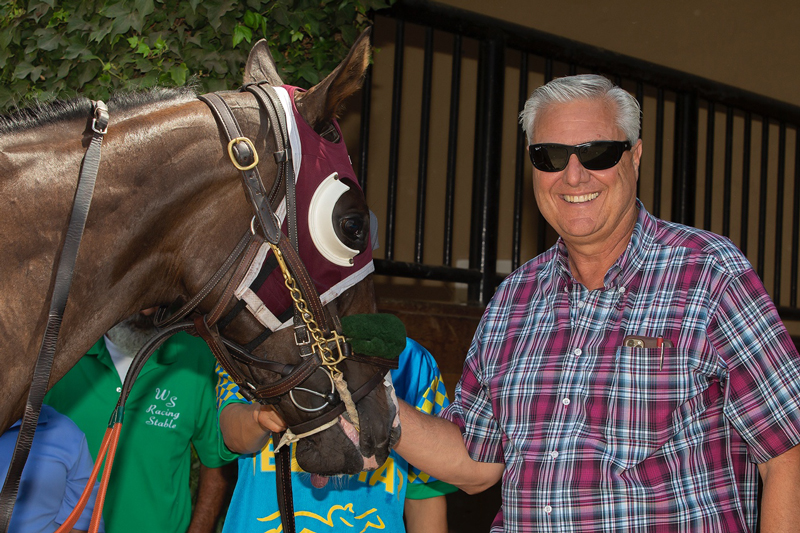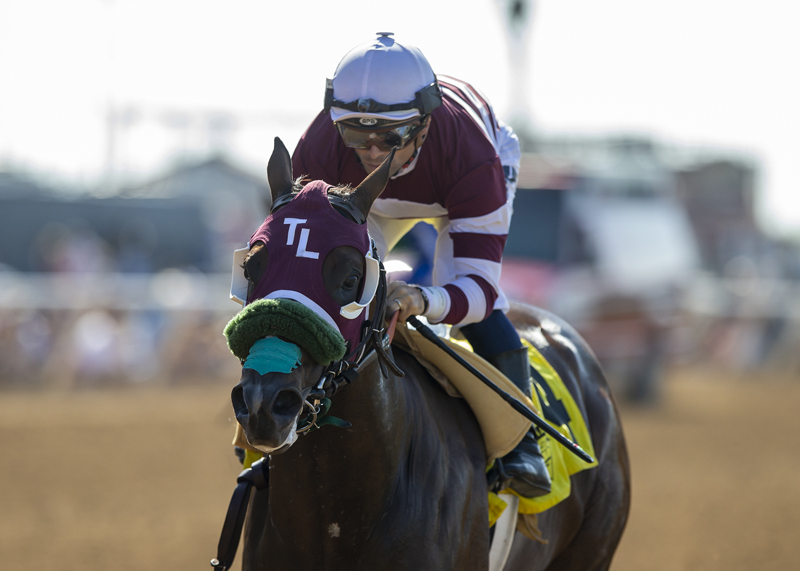
Terry Lovingier © Benoit Photo
By Jim Charvat
When you love a sport as much as Terry Lovingier loves horse racing, the time and effort you put into it is irrelevant. That is why when you ask Lovingier where he finds the time and energy to be chairperson of the board for the California Thoroughbred Breeders Association, secretary for the Thoroughbred Owners of California, owner of a successful Thoroughbred breeding operation and be the Thoroughbred Owners and Breeders Association’s Breeder of the Year, he just smiles and says he wouldn’t do it if he didn’t enjoy it.
Terry Lovingier is a major proponent of California horse racing, one of many people spearheading efforts to keep horseracing alive in California. His passion begins as a breeder and the owner of a large Thoroughbred ranch in Warner Springs called Lovacres.
“I enjoy breeding, I enjoy birthing babies,” Lovingier says. “I enjoy watching them grow up. I don’t think there’s any more gratification than to breed, birth and raise a baby and have it go well. They’re like your kids. “
From there he branches out, proactively getting people involved in the sport through investment partnerships. He estimates he has about 30 or more current active partners.
“I have a lot of friends that like horse racing,” Lovingier says, “but they don’t want to own the whole horse so they just buy parts to participate. They like to spread so they have more opportunities and more chance to win and I encourage them to do that. And on top of that it’s more fun for me to have the friendship and the comradery.”
Lovingier has no problem with the giant partnerships that offer fans micro shares of horses.
“I think it’s probably great for horseracing,” he says. “It gives people a chance to have a piece of something and participate in it. It think it’s a good thing as long as you don’t go into it thinking you’re going to make any money. I mean, you can. It’s all gambling, it’s just on what scale do you want to play.”
Then there’s Lovingier’s involvement in the administration end of the horse racing industry. He’s been with the California Thoroughbred Breeders Association for 12 years.

Lovingier & Smokin Cheena © Benoit Photo
“The CTBA’s charter is to promote breeding,” Lovingier says. “I think our forefathers got it right with the ‘breed back’ rule. You buy mares in Kentucky, bring them out here, foal the babies and then breed back to a California sire and then you have a Cal-bred.”
Lovingier believes the Cal-bred program is essential to keeping horse racing operating in California.
“At each level there’s a spot for every horse,” Lovingier reasons. “You just have to find the right spots for them. Cal-bred levels give you the ability to compete and not necessarily have to do it against all the million dollar horses; but if your horse does get that good, then you can.”
Lovingier knows a good horse when he sees one. His family is from Oklahoma though Terry was raised Lakewood, California where he developed his love for horses at an early age.
“Around the age of five, in Lakewood,” Lovingier recollects, “my dad had Quarter horses in our backyard on union land my dad took care of. I helped him take care of the horses.”
Fast forward to 1990, when he and his father and brother purchased a ranch outside of Waco, Texas. It was at the ranch they raised Streakin Flyer, a horse that won the 1996 All-American Futurity, the Kentucky Derby of Quarter horse racing. But by then, Lovingier was working and raising his family in California and the trips back to Texas began to wear him.
“It became a bit too much for me to fly there and then drive to it because the last hour was on dirt roads at the time,” he remembers. “So we moved everything back to Murrietta only to have the government eminent domain my property. We had really good well water in the valley and prior to 2005 the building of houses was going nuts and they eminent domained my ranch because they needed the water. I get it, it’s for the betterment of society, so from there they moved us up to our current location in Warner Springs.”
That’s where he started Lovacres, a beautiful, sprawling 600-acre property where he started investing in and breeding Thoroughbreds.
“There’s probably 50-to-60 productive mares and then I built a retirement pasture so I probably have another 20-or-30 out there,” he notes. “It’s really a pretty piece of property; the horses aren’t stressed and they just do well”
He’s brought some excellent stallions to Lovacres: Phantom Boss, Smokem and Oscar Nominated. But none as successful, so quickly, as Stay Thirsty.
“He did something this year that you don’t ever see,” Lovingier said. “He’s a 2008 model and he’s already surpassed all of the stallions who have ever been to California in progeny earnings for 2-year-olds and he’s still got more crops coming behind him.”
In 2021, Stay Thirsty’s first crop in California, he led in Cal-bred 2-year-old purse earnings, in the number of 2-year-old winners and number of races won. In all, Stay Thirsty’s purse earnings in 2021 exceeded $5 million, one of the reasons Lovingier was named Thoroughbred Owners and Breeders Association California Breeder of the Year.
“It means a lot because there are a lot of good breeders here in California,” Lovingier notes. “You have to put in a lot to get there. We breed them, we birth them and then we spend two more years just to get there. So it means a lot.”
Breeding horses isn’t Lovingier’s only source of income. He’s also in the oil business.
“I have a company that does maintenance in refineries,” Lovingier says, “and I have five recycling units that recycle asphalt and concrete. I have a civil and environmental engineering degree at UC Irvine and I put that to use in the environmental business, but also in the oil company.”

Rock N Rye winning 2021 Graduation Stakes © Benoit Photo
Lovingier hit the exacta last year when his Cal-bred Finneus was named the 2021 champion Cal-bred 2-year-old male and his At the Spa was named the 2021 champion Cal-bred filly. He won the Graduation Stakes at Del Mar in 2021 with his colt Rock N Rye. When he’s not watching his ‘babies’ race, he’s the acting secretary for the Thoroughbred Owners of California.
“The TOC charter is to represent owners in horse racing, whether they are Cal-bred or not,” Lovinger says. “I’ve been fortunate to work under Mike Pegram, Nick Alexander, and now under Gary Fenton. The TOC board is loaded with really, really good people. Intelligent people who really care about their horses and I think we got a lot of good things happening.”
Lovingier doesn’t buy into all the doomsday scenarios about horse racing, especially in California.
“We’re going good here,” Lovingier points out. “If you look at the fields here, there is a higher percentage of Cal-breds that stick on the circuit now than ever before. Probably because there are higher caliber mares out here now. Maybe not as many as there were 10 years ago, but certainly a higher caliber.”
Lovingier credits the breeders themselves for raising the quality of racehorses in the Golden State.
“I think the breeders associations and the breeders themselves, the Tommy Towns and myself, George Krikorian, Nick Alexander, Harris Farms and Legacy Ranch…all are committed to racing,” Lovingier says. “They are trying to compete at a higher level and they’ve raised the level at which we are competing. All you have to do is look at the maiden special weight bonus program. Cal-breds are winning more of those in open company.”
Lovingier is just as proud of the efforts being made in California to help Thoroughbreds after they retire from racing.
“You can always improve things,” Lovingier says, “but the truth is if you sit somewhere and talk horse racing to somebody, they don’t realize there’s a penny or two out of every dollar bet that goes toward re-careering racehorses. That word needs to get out there. Let people know that we do love our horses; that we do take care of them. That message is good but we can always do a little better job at it.”
So what is Lovingier’s vision of California horse racing moving forward?
“If you look at Del Mar and how well they’re doing, people still love horse racing. Now that we’re making more of an effort to protect our horses it’s going to continue forward in a great manner. All we have to do is keep getting after it and protecting our horses.”
